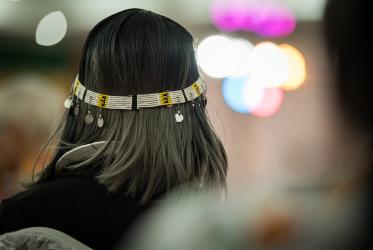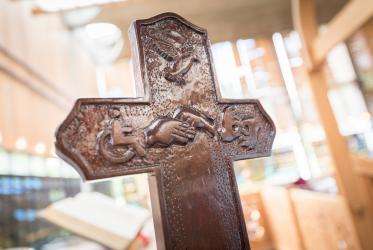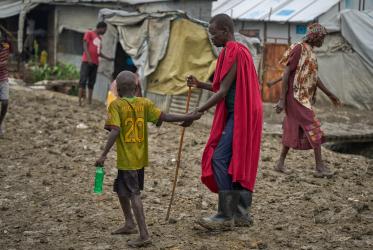Free photos available, see below
Member church representatives from the World Council of Churches' (WCC) Pacific region made a plea for ecumenical solidarity on Friday. In a plenary session during the current meeting of the WCC central committee in Geneva they shared their concerns on several major issues affecting their culture and way of life.
Rev. Jabez Bryce of the Anglican Church in Aotearoa New Zealand and Polynesia thanked the WCC for its presence in the region, which has 19 WCC member churches; he then introduced a series of other speakers who explored the significant issues of climate change, HIV/AIDS, and the fallout of nuclear testing.
Selai Cati of Kiribati said that climate change is threatening these island-nations' way of life with increasingly extreme weather, rising sea levels, erosion, and loss of crops. "For us it is a matter of life and death," she declared. The Pacific region was described as "the liquid continent", consisting as it does of widely distributed small islands sitting in millions of square kilometres of ocean.
Cati called on the United States and Australia to sign on to the Kyoto Protocol (which officially became international law this week). She presented a list of recommendations to the central committee, including one that called "on our sisters and brothers in Christ throughout the world to act in solidarity with us to reduce the causes of human-induced climate change". The recommendation especially extended that call to the highly industrialized nations to take responsibility and pay "for the costs of adaptation to the impacts that can be anticipated".
Delegates later affirmed those recommendations, asking the general secretary to implement them through appropriate WCC programmes. Rev. Gregor Henderson, from the Uniting Church in Australia, said he "felt humbled" by the fact that his country is one of the industrialized nations contributing to this tragedy. He also reported that Australian member churches have decided to continue in solidarity with those affected.
Emosi Ratini of Fiji shared a moving personal story of his experience of being HIV-positive, saying he did so in the hope of increasing awareness and "to humanize HIV/AIDS and give it a face". Ratini was appointed as an intern to work on HIV/AIDS issues for the WCC Pacific office, which he called a life-changing experience.
John Doom of the Maòhi Protestant Church detailed the sad history of nuclear testing in the region, with 322 such tests between 1946 and 1996. He asked the WCC to continue to make the test victims' voices heard and to help them obtain compensation.
Pacific Conference of Churches general secretary Valamotu Palu closed the session, saying: "We have taken you to the Pacific and presented you with the hopes and dreams of our people. We need action, and, more importantly, we need solidarity from our Christian brothers and sisters."
Free high resolution pictures and additional information about the WCC central committee meeting are available at:







